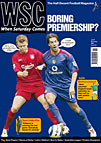 Is it too good to be true? Scotland has been longing for a club to break the Old Firm's dominance but, as Neil Forsyth asks, are Hearts stable enough?
Is it too good to be true? Scotland has been longing for a club to break the Old Firm's dominance but, as Neil Forsyth asks, are Hearts stable enough?
The Scottish Premier League has long been a private title battle between the Old Firm with the other clubs reduced to contesting a UEFA Cup spot, derby wins and even the honour of being a top-six team after the league splits. This campaign has so far been as predictable as ever, but with a significant difference. The catalyst of Hearts’ incredible run (eight games, eight wins at the time of writing) is printed boldly on the team’s strips. Ukio Bankas is not just the team sponsor but also the Lithuanian bank part-owned by the club’s owner Vladimir Romanov. Since replacing former manager John Robertson with George Burley, Romanov has bankrolled an influx of foreign talent to the club that Burley has quickly gelled into a highly effective team.
Their blistering start to the season has, of course, gone done well with their swollen support, but it also represents a possible salvation for a league that has grown tired and internecine. There have been various causes for the latter, such as persistent relegation issues and the fiasco over Dunfermline’s plastic pitch, but uncertainty over the Old Firm’s position is the biggest factor. The two Glasgow monoliths have been hankering after membership of the English Premier League since its inception and officials from both clubs were involved in the development plans of the abandoned Atlantic League. When only two other clubs (Aberdeen and Dundee United) have won the SPL since its first version arrived in 1975, you can understand the Old Firm’s demands for greater competition.
However, what are equally clear are the motivations behind their planned elope. If Hearts can win the league, or even split Celtic and Rangers by gaining second place, then the Old Firm will no longer be able to cite lack of credible opposition as an excuse for leaving. Only the yearning for greater financial returns, principally from television, will remain and it is unlikely that even UEFA would bow to such an obviously mercenary attitude.
There may therefore be revolution in the air, but there are some concerns about the Romanov regime that Hearts’ early success has camouflaged. Why, for starters, did Dundee United, Dundee and Dunfermline all turn down Romanov’s advances at some point in the past few years? There were murmurings that they were unsatisfied with his financial guarantees, so how did the jilted Lithuanian manage to get a positive response from Hearts?
The answer is unclear, though the major shareholders of Dunfermline and Dundee United were not willing sellers at the time. Dundee is another matter, but the club’s recent financial meltdown caused all its business dealings to be shrouded in a fog of intrigue. What is certain is that three clubs met with Romanov or his advisers and decided to pass.
Stories concerning the financial viability of Romanov’s bank have also been of interest to the Scottish media, with the sports pages making a valiant attempt to interpret international banking ratings. More pressing has been the continual speculation regarding Romanov’s relationship with Burley. It is unlikely that the Hearts manager had much to do with the influx of players from eastern Europe, who have been instrumental in the club’s sensational start: Czech striker Rudi Skacel, on loan from Marseille, scored in the first seven league games. There have even been acknowledged occasions when players identified by Burley have not been brought in when available, only for another Romanov pick to arrive at Edinburgh Airport shortly after. “I’m investing money so it’s my right to buy players,” is Romanov’s explanation. “Not ideal,” was Burley’s curt response.
As long as things stay on track, such faults with the Hearts revolution will remain as nagging doubts. A run of misfortune, however, could cause an irreversible breakdown between Burley and the man from Ukio Bankas. But for now, at least, neutrals are joining Hearts fans in celebrating the overdue return of a competitive national league.
From WSC 225 November 2005. What was happening this month